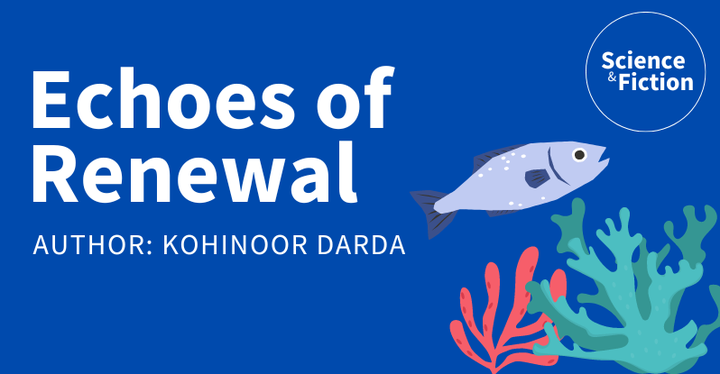
Discover how the soothing sounds of healthy reefs can lure fish back to damaged coral habitats, sparking a new way to restore underwater ecosystems.
Content warnings
None
The short story
Can you find the story in the dance? :)
Once upon a time, in the vast underwater world, coral reefs faced a big challenge. Humans had unknowingly caused great damage to these vibrant underwater cities, leading scientists to search for innovative ways to protect and restore them. One thing was clear: keeping fish populations strong could help prevent further reef decline. But there was a catch - damaged reefs didn’t sound or smell appealing to young fish looking for a new home.
To find a solution, a team of researchers set up a six-week experiment. They played the soothing sounds of healthy reefs around damaged coral patches, hoping it would attract more fish. And guess what? It worked! The reefs playing the healthy sounds had twice as many fish and 50% more species than the silent, untouched areas nearby.
This boost was seen across all kinds of fish, creating a lively, balanced community. The scientists believed that by combining this clever “acoustic enrichment” with other reef restoration efforts, we could help rebuild fish populations and speed up the recovery of coral reefs. So, by simply bringing back the music of a thriving reef, these researchers found a new tool to restore these precious underwater worlds.
This story was originally written in English.
The paper
Gordon, T. A., Radford, A. N., Davidson, I. K., Barnes, K., McCloskey, K., Nedelec, S. L., … & Simpson, S. D. (2019). Acoustic enrichment can enhance fish community development on degraded coral reef habitat. Nature Communications, 10(1), 5414. https://www.nature.com/articles/s41467-019-13186-2
Connection between story and paper
Climate change and human impacts are causing widespread damage to coral reefs, demanding new management strategies. Maintaining healthy fish populations is crucial for reef recovery, as they play key ecological roles. However, degraded reefs often lack the sensory cues needed to attract juvenile fish. This study explores using “acoustic enrichment” (broadcasting healthy reef sounds) to attract young fish and aid reef restoration. Experiments on Australia’s Great Barrier Reef demonstrated that reefs with acoustic enrichment had double the number of juvenile damselfish (a key family) compared to control reefs. Moreover, the enriched reefs had healthier fish populations across various feeding guilds, with improved abundance, species richness, and diversity. These results suggest that acoustic enrichment could be a promising tool to complement existing reef management techniques. Further research is needed to understand its effects in different contexts, impacts on adult fish, and long-term benefits for natural settlement.
The author
Kohinoor holds a PhD in Cognitive Neuroscience and explores the cognitive mechanisms of social interaction and aesthetic appreciation. She’s a trained Indian classical dancer who blends dance and neuroscience in her work. Find out more about her on her website.